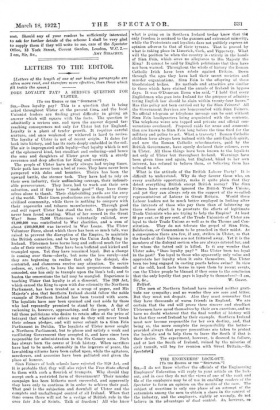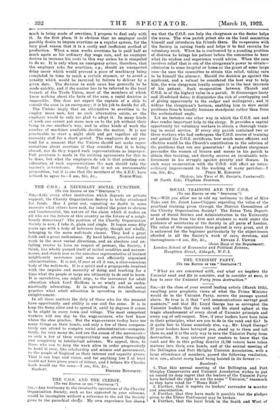THE ENGINEERS' LOCK-OUT.
[To THE EDITOR Or TEE " SPECTATOR."3 SI1L—I do not know whether the officials of the Engineering Employers' Federation will reply to your article on the lock- out, and in case they do not the views of one of the rank and file of the employers may be of use in enabling readers of the Spectator to form an opinion on the merits of the case. The subject of overtime is only one phase of an attempt of the extremists among the men to obtain a share in the control of the industry, and the employers, rightly or wrongly, do not believe in the advantages of dual control. As, however, so
much is being made of overtime, I propose to deal only with It. In the first place, it is obvious that no employer could possibly desire to impose overtime as a regular system, for the very good reason that it is a costly and inefficient method of production. When a man works overtime he is paid half as much again as his ordinary day wage rate, and no employer desires to increase his costs in this way unless he is compelled to do so. It is only when an emergency arises, therefore, that the employer asks for overtime, e.g., should an unexpected delay occur which would prevent a piece of machinery being completed in time to catch a certain steamer, or to avoid a penalty which would be incurred by failure to deliver by a given date. The decision in such cases has generally to be made quickly, and if the matter has to be referred to the local branch of the Trade Union, most of the members of which know nothing about the facts of the case, a rapid decision is impossible. One does not expect the captain of a ship to consult the crew in an emergency; it is his job to decide for all.
The Unions imply that an alternative to overtime is to employ more men, but no such alternative exists, or the employer would be only too glad to adopt it. In many kinds of work one cannot put more men on to the job without their being in one another's way, and in other kinds of work the number of machines available decides the matter. It is not practicable to start a night shift and get together all the necessary staff for a short period. The employers do not pre- tend for a moment that the Unions should not make repre- sentations about overtime if they consider that it is being abused, nor do they regard such representations as improper. Full provision is made in the existing agreements for this to be done, but what the employers do ask is that pending con- sideration of such representations the men should take the master's instructions: Surely that is not an unreasonable Proposition, but it is one that the members of the A.E.U. have refused to agree to.—I am, Sir, &c., NORTH-WEST.



































 Previous page
Previous page